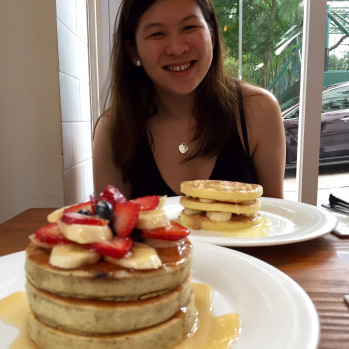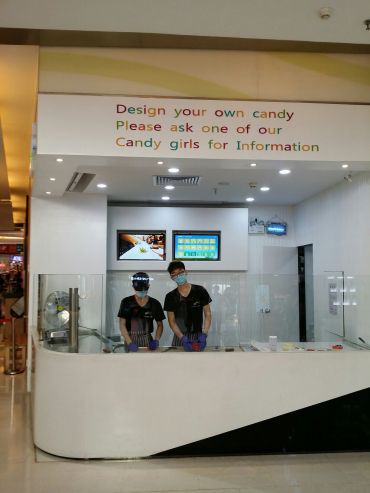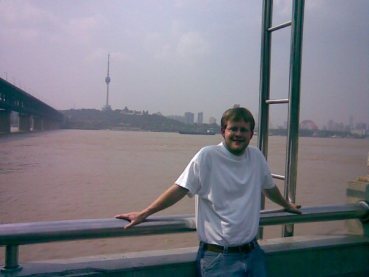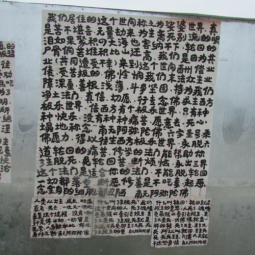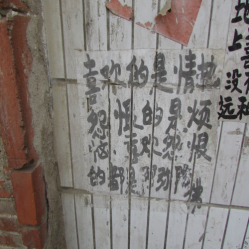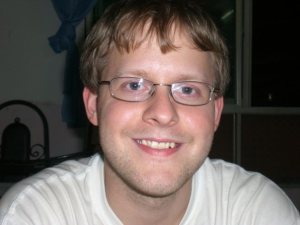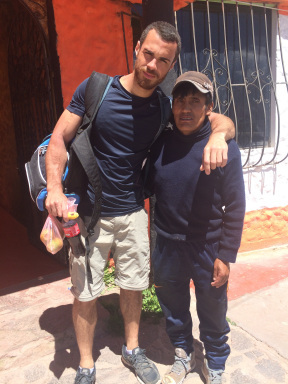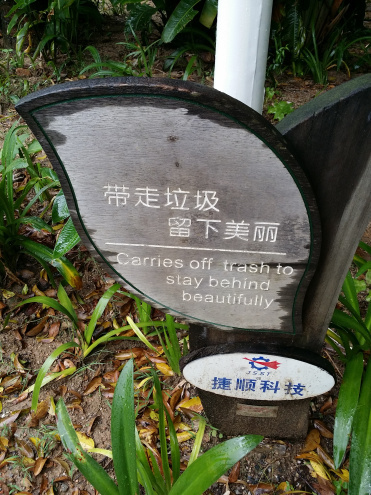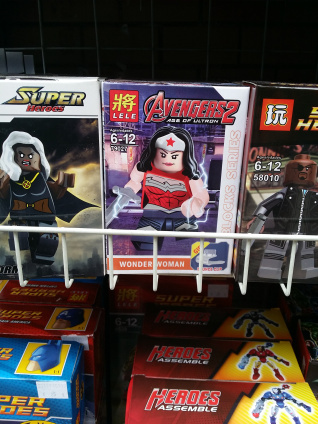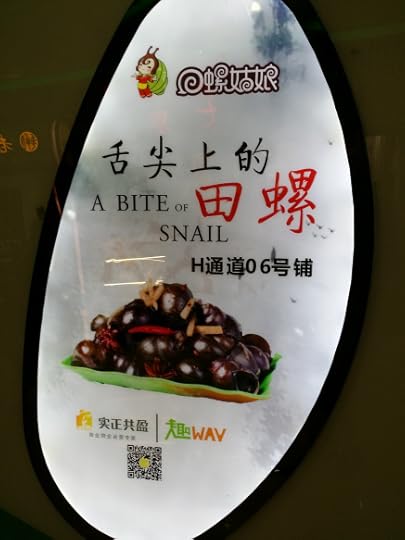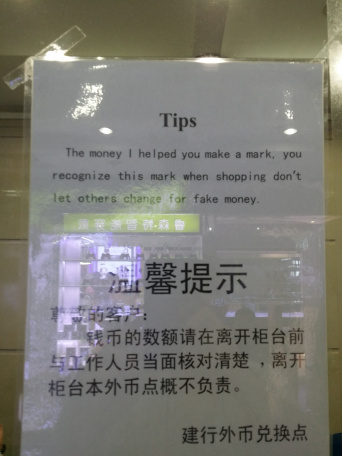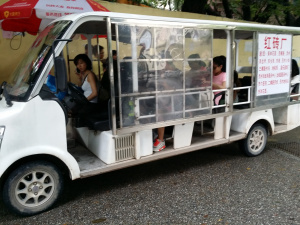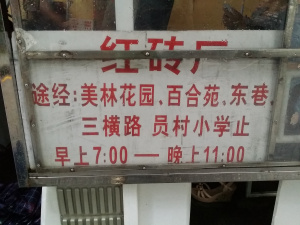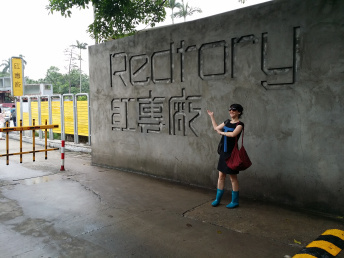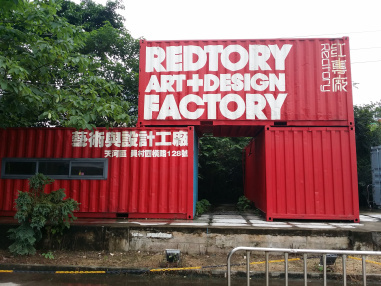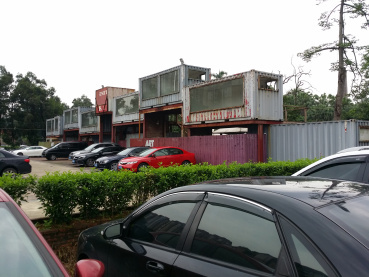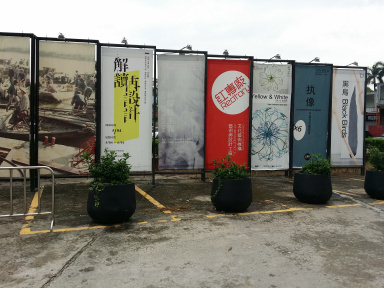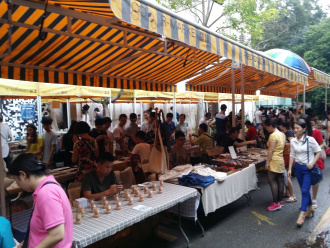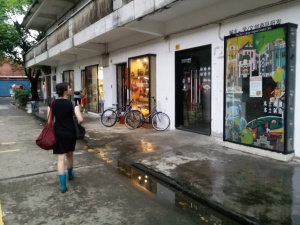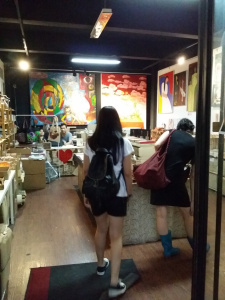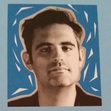Ray Hecht's Blog, page 30
July 6, 2015
An interview with Jocelyn Wong
Today I have an interview with Hong Kong-based food blogger and journalist. Jocelyn Wong.
She writes at the aptly named http://jocelynwrites.com, do check it out for some delicious posts…
When did you first decide that being a writer was for you?
I pretty much got the bug after winning my first writing competition that I entered for fun because I liked the topic. It was something along the lines of Hair Disasters. I shared my experience of getting a bad haircut which ended in tears and getting the back of my head shaved. After that I entered an SCMP writing competition and won. The next step that really solidified my passion for writing was getting a two-week internship with Young Post which got extended to the end of the summer. Afterwards, I got hired as a freelancer for them and everything else is history.
Do you find being a journalist to be rewarding work?
Absolutely. Working for Young Post is one of the most inspiring experiences for me. Getting to work so closely with the talented youth in Hong Kong and being a part of their lives — helping them improve their English bit by bit, day by day.
Are you inspired by any writers, Hong Kong-based or otherwise?
There are some pretty big names out there that I’m inspired by but for now my aspirations lie in tangent with those of Jason Ng – the SCMP columnist who wrote best selling Hong Kong State of Mind and Pete Spurrier – who owns Blacksmith Books. Someday I want to have my own publishing house and discover new writing talent.
(In the interest of full disclosure, Ray Hecht would like to note that his forthcoming novel South China Morning Blues will be published by Blacksmith Books)
Being that you have a food-based blog, are you interested in cooking as well as being a foodie?
I have always been interested in baking — so it’s more likely that I’ll end up as a pastry chef rather than a cook. I love just working up a storm in the kitchen with the blender, mixer and flour. Copious amounts of flour and brown sugar decorate the kitchen floor by the time I’m done baking some treat or another; also, I just love the smell that fills up my apartment after I’m done baking. The smell of molten chocolate is absolutely heavenly.
That being said, I do love getting my hands dirty in the kitchen. Instead of making ramen noodles in college, I remember spending the bulk of my free time googling recipes of healthy food, because I couldn’t bear to gain that “freshmen fifteen” if I could help it.
Now that I’m back in Hong Kong, I’ve really enjoyed having a full kitchen with proper counter space and international ingredients and spices to work with. Back in my college days, I’d have to do prep in my living room because my kitchen was so small. I think I whip up some pretty good scallop medallions, and I devised my own perfect pesto sauce in my college days.
What kind of food did you grow up eating?
I was lucky enough to grow up in a multicultural environment and my parents are foodies as well. Even at home, my mother would try to cook as many different types of cuisine as possible, even if most of it was Chinese. China has a diverse food culture and I feel like I really got to know it as I grew up (since at one point, my father couldn’t bear the thought of not having at least three Chinese meals a week. This is how my mother got creative – by having those restraints).
In terms of eating out, we were regulars at the now defunct Japanese restaurant in the old Ritz Carlton in Central, Tenjaku in Lantern St, as well as Brasserie on the Eighth, Ming Yuen in Parkview and the McDonalds by Repulse Bay just to name a few. I still maintain that Hong Kong has the best McD’s in the world.
When I went to university, that’s when I got serious about cooking. I was also really conscious about staying healthy. That being said, I had my fair share of 2 a.m. pizzas and Timmy’s (surely you’ve heard of our famous Canadian Tim Horton’s doughnuts), but generally I’d say I kept a healthy diet. Within months of settling into college, I really quickly learned how to make healthy and delicious foods like grilled ahi tuna with green and white peppercorns, turkey burgers and bake gluten free cookies (that don’t taste like cardboard).
Do you enjoy the Hong Kong restaurant scene because of authentic Cantonese cuisine, or because of the diverse international range of tastes in the city?
I love it for both the authentic Cantonese food and the diverse international range of tastes in the city. I don’t know if I’ve traveled anywhere else with such an amazing food culture. At just about any street corner, you’ll be able to find great cha chaan tengs with amazing Hong Kong style french toast (like pizza, it’s very hard to go wrong with this dish) or a small, hole-in-the-wall Italian restaurant with a delicate platter of steamed Clams in white wine, garlic, and butter. Perfection.
Where you ever surprised by which blog gained the most popularity?
I knew I would get a following on my music blog because of my radio show in Canada. What kind of shocked me was that there was a following for my food blog, because I never did much in terms of social media for it so people literally had to stumble upon it and like my style of writing for it to happen. I still find it strange though that most my readers are from the U.S. and Yugoslavia — since my blogs don’t feature much that I feel will entice audiences over there. But nonetheless I am pleasantly surprised.
You have at least one blog post reviewing a restaurant in Ottawa, Canada. Are you interested in being a travel writer as well? Can we expect any new locations for upcoming posts?
I am definitely interested. Each time I go somewhere new, I definitely have my camera by my side to snap a few shots. However, I don’t see myself travelling much in the near future. Although I am going to be in Toronto for a few days in August, so stay tuned!
Finally, the author of this interview happens to be a vegetarian. Would you recommend any meatless restaurants for my readers?
Lok Cha teahouse is fantastic and Choice does the most amazing gluten free bread and smoothies in town
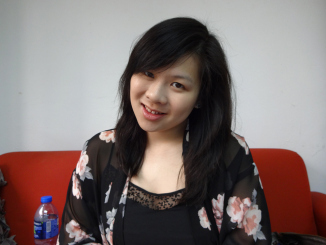


July 2, 2015
Candy girls
June 29, 2015
Interview with Travis Lee
Today’s interview is with up-and-coming author Travis Lee, who writes about expats and China. Topics to be discussed will include the nature of living abroad as well as meditations upon the act of writing.
More from Travis Lee can be found at these links:
https://www.facebook.com/travislee19
https://www.smashwords.com/profile/view/travislee
Firstly, can you tell us about how you came to China?
My how I came to China story is nowhere near as interesting as yours, I’m afraid. I was a French major in college, and as graduation loomed like a fall into a deep pit, I applied to teach English at a French high school, in the assistant d’anglais program. I wasn’t selected.
To this day, I’m not sure why. I had a high GPA, good recommendations, good French and previous in-country experience, so I had all the right checks in the right boxes. It could have been the sheer number of applicants; the professors who assured me that everyone gets in had done the program in the seventies and eighties.
Whatever the reason, that changed everything. Had I gone to France, I wouldn’t have my wife, my daughter, the books I’ve written. We wouldn’t be doing this interview. Right now, I’d be finishing my PhD, praying for tenure.
So instead of preparing for a summer in France, I moved back home and worked on plan B: volunteering in France. While I looked for positions, I received an email through my university’s career services distro: a Tennessee alumnus who worked in Wuhan was looking for English teachers. I read through the email. Free apartment, travel money, chance to see a dynamic country in a real Chinese city. Plus, a Western toilet. Don’t you love how he used Western toilet as a selling point?
I did all the paperwork, and on August 26, 2008 I touched down at Tianhe Airport in Wuhan, China.
What your life was like here?
Like most experiences, it looks better in hindsight. The earlier times are not better, just earlier, but it can hard to acknowledge that.
So, my life, in a word? Free. I felt like I had a lot of opportunity. I had enough time to pursue any hobby I wanted. I studied a lot of Mandarin, kept up with my French, taught myself some Calculus, and I wrote. This was the time in my life when I began to take writing very seriously. I “turned pro”, as Steven Pressfield would put it.
Although I was poor and twenty pounds overweight, I look back on my two and a half years fondly. My life changed completely. My first year and a half or so wasn’t easy — a lot of ESL teacher politics, personal issues — but once I moved past that, things got better. One thing that helped was Wuhan University. There I had only one co-worker, a normal guy, and I never saw him anyways. I taught great students in the afternoons, freeing up my mornings to study and write. I made friends with some great classmates. Wuhan University has a sizable international student population; a very cosmopolitan atmosphere.
I read a lot of expat blogs too. There was a certain buzz in the air. I found some great writers, who unknowingly helped me a lot, just because I read what they wrote.
What do you miss about China? What do you not miss at all?
I miss the free time I had. I miss how even the simple act of going to the store and buying a soda could turn into a story. And travel. I saw some nice places; wish I’d seen more.
What do I not miss? Respiratory infections, one. Internet censorship, the typical stuff that can make life in China hard.
At Wuhan University we were letting my brother-in-law stay over sometimes. The guy who worked the front desk noticed him coming in and out, and he asked us for 200 RMB a month. I said no, and the Foreign Affairs Officer came over and told me to either pay more or my brother-in-law couldn’t spend the night. Their excuse was the electric bill.
Can you describe your writing process?
I’m very much a cover-the-canvas guy. I can’t do outlines; I’ve tried it before, and I ended up either deviating from the outline or not writing the actual story. Outlines work well for class, not so much for writing. I prefer the spontaneity; I can’t write if I know exactly what’s going to happen. It kills all the fun.
So I write and write and write until I have something, and after some time has passed, I revise it. I go through about three drafts. I used to retype my drafts, I stopped doing that. I don’t have the time. I work and right now go to school full-time; I write new stuff in the mornings, revise at night unless I have a big test coming up.
I listen to Final Fantasy music when I write, either Final Fantasy Radio or my own playlist. It helps lock me in my own little world.
Which books and authors have inspired you?
The Road, by Cormac McCarthy. Beautiful writing, very emotional. Child of God is good too, mainly for the prose. There’s a line in Child of God where Cormac McCarthy describes a woman’s widening pupils as a “breaking brimstone galaxy”.
The Alchemist, by Paulo Coehlo. This book captures what it’s like to chase your dream against many obstacles.
The War of Art, by Steven Pressfield. It has the best writing advice I’ve ever seen. But it’s not limited there; you can apply it to any calling.
What are you working on now?
The Pale Ancient & the House of Mirrors, about a missing foreign journalist and his friends’ efforts to find him. I want to publish it through a China-based publisher.
Richard, an amateur foreign journalist, goes missing while investigating a blood cult in Hubei province. Four people are affected: Mary, a newbie China writer who dreams of cementing her name alongside the expat greats; Ying Li, a small-town police sergeant; Chris, a freelance translator whose own experience with the cult has left him scarred; and Daniel, an expat media mogul with drug problems and a failing marriage.
Why did you choose to write this particular story?
The Pale Ancient & the House of Mirrors has two big inspirations: Unsavory Elements and the documentary Though I Am Gone.
I made a return trip to China in March, 2014. We stayed in my wife’s hometown, a small town in Hubei province. I read Unsavory Elements while there and had the idea to do a story like that, where different people told different stories about their experiences in China, all tied together by a lengthy plot. I intended parts of it to be a deconstruction of expat writing. I began writing it, and I hit a wall; the story didn’t feel right to me.
I liked to ride my father-in-law’s bicycle around my wife’s hometown and out into the country. While out there, I rode past an abandoned house with one of those small mirrors above the front door, the bagua mirror. Just down the road was a small temple. I thought, what if the house and the temple were connected? Who were these people? Why did they leave? Who was inside the temple?
I also noticed messages taped around my wife’s hometown. Some old, some new, I asked my wife. She thought they had something to do with Buddhism. But once I noticed one message, I noticed all of them; they were all over the place, mysterious, perhaps sinister. And not all these messages were new. Some were barely readable while others looked like they’d been posted yesterday. Someone had been doing this for years. Why?
With all this in the back of my mind, I returned to the States and a couple months later I thought of the house, the temple and the messages, and perhaps a young woman who accepted a friend’s invitation to visit the town. The man who invited her wants to show her what he considers “real China”, but what if she saw the messages? What if they led her to something dangerous?
Some mysterious messages…
Is The Pale Ancient & the House of Mirrors semi-autobiographical in nature?
There are elements of my own life in there, particularly my 2014 China trip. Coming back after three years, I saw how much had changed. I also saw things differently too. Mary’s part is very much from my return trip. Chris’s part, set in 2007, draws from the optimism you feel during your early China years as well as my own experiences of studying at Wuhan University.
Daniel’s part, set in the present day, is less about me than it is about people in general. Daniel clings to an idealized version of the past. He runs a China blog that enjoyed a very good run a few years ago. Today it’s nothing, but Daniel won’t face it. All of the writers from the blog’s heyday have left China, moving on with their lives while Daniel still acts like it’s 2009.
Daniel also has marital problems. He avoids these too; he won’t face the fact that his wife would rather wash down sleeping pills with wine than spend time with him. Daniel talks to a fortune cat he named Steve. Steve talks back. But no, I don’t talk to a fortune cat and my wife doesn’t pop pills. For Daniel, it’s the inability to see how damaged his life is. Daniel could easily fix all his problems; he’s just too cowardly to do it.
What kinds of themes in literature are interesting to you?
Life and death, the big ones. I’m interesting in how people change, or don’t change. The passage of time, it’s effects on the mind. Our limited time here, and what we make of it. The distractions we invent, the few who face it head-on.
I wonder a lot about the people I worked with back in 2008 China. What’s happened to them? One of my classmates from Wuhan University, I looked him up on Facebook the other day. Can you guess what he’s doing? Living in the same city, going to the same clubs, partying just like he did five years ago. The rest of us from my class have left China, but this guys has stuck around, partying in a smoggy Never-Never Land.
I’m also interested in how places change and the effect it has on people. Look at how much not only Wuhan but my wife’s hometown has changed. What other changes are coming? You have a favorite place, you have memories there, and one day it’s been knocked down. A lot of that came out in The Pale Ancient & the House of Mirrors.
What would you like readers to learn about China?
I hope they see China is a dynamic country that like every other place has its charms and its warts. But the conclusions that people draw about China, it’s out of my hands. I can steer as best I can, but they still have pull the ship into port.


June 25, 2015
Interview: Darcy Shillingford
Interview with the amazingly well-traveled Darcy Shillingford, Canadian novelist and blogger for the travel site travelingspaceopera.com
Pic info: “just as I was about to hop on a bus, leaving Cabanaconde to head to Arequipa, then eventually Cuzco. Caesar, who I’m pictured with, was our host in Cabanaconde.”
What is your writing process like?
It varies depending on the kind of writing I’m doing. With my travel blog posts, I try to put myself in a relaxed, informal state of mind. I give myself freedom to let my stream of consciousness flow, while trying to maintain some kind of structure and thematic consistency. Imagery is important to me, and despite the fact that I can throw in as many pictures as I want, my goal is for my writing to be able to evoke colourful detail with or without them. I want the reader to feel like they’re walking alongside with me.
As far as fiction goes, I can’t force creativity. I can sit there looking at a blank page or computer screen for a long time and nothing comes to mind. Other times, I’ve been lying in bed at two in the morning and suddenly think of an idea concept that I have to write down and develop a little bit before I can go to sleep. When I’m on a role, though, I try to let it snowball and see how far I can take it. The only fiction I’ve put a lot of effort into is in the sci-fi genre, and I try to write what I would want to read if I were to pick it up myself.
How do you compare travel writing with fiction writing?
For me, fiction writing has been far more time consuming. In addition to creating a plot, out-of-this-world (literally) settings, characters, and so forth, there is a great deal of research involved due to the genre choice. I’m no scientist, but I do take advantage of the relatively unlimited academic resources at my disposal and have put in countless hours researching elements of astrophysics, the gathering and employment of military intelligence, planetary and solar physics, religious and political history at a global level, various elements of the social sciences, philosophy, and so forth.
What gives you inspiration for fiction?
It depends on what aspect. I get inspiration for characters from my daily interactions with all kinds of people. I work at a restaurant and meet dozens of people a day. Also, the people I’ve met traveling are so varied and interesting that I can’t help but be inspired by them. When it comes to plot, I’m inspired by my education, particularly in the realm of history and politics. I like grand, I like big, I like epic, but I also like obscure. Random bits of military or colonial history that were glossed over in school, or missed altogether, fascinate me.
What are your favorite books?
Use of Weapons and Feersum Enjinn, both by the late Scottish author Iain M. Banks are certainly in my top five. I also appreciate classic or golden-era sci-fi, but I also think some of the classics haven’t aged well, particularly in regards to their social commentary. I also grew up loving the Harry Potter series. Stephen King is awesome as well; very psychologically immersive and vivid.
Why did you choose to spend your time in 2013 traveling in Southeast Asia?
I simply had to. I was at a point in my life where I’d recently graduated from university and didn’t quite know what I wanted to do with my life. My girlfriend and I had done some all-inclusives, but had also discussed doing some “real” travel. What began as an idea for a month or two in South America turned into half a year in Southeast Asia. When I look at a picture of the two of us at a wedding a couple days before we left for this trip, I get jealous of that guy. He has the best adventure of life just on the horizon.
Is it difficult to write about your experiences going back two years? Did you keep journals at the time or anything like that to help you to write about it now?
I did keep journals, but I rarely need to refer to them. I usually only look at them to remember the name of a person I met along the way. Having taken a couple thousand pictures makes it fairly easy to track everything we did, but every so often, a detail or nuance will creep into my memory that I hadn’t thought of since it happened.
You most recently traveled in South America, correct? What cultural differences have you come across that contrast with the Southeast Asian experience?
I actually wrapped up the Peru trip in mid-April. We were there for 18 days. The first thing I took into account were the similarities with Asia: the scorching heat, the abundance of cheap stall food, the hokey tourist areas where local merchants spout silly lines to travelers in order to charm them into overpaying for whatever product or service. All great stuff, in my opinion. The thing with Southeast Asia is that I visited seven countries so there are dozens of differences even between those countries. I found, though, that the food in Peru is a lot heavier and starchier. Also, the weather was far more erratic, perhaps because we spent much of the journey either in the Andes or the Amazon Jungle.
Which country or countries (Southeast Asian and/or South American) gives you the most inspiration?
Vietnam may have been the most inspiring, but as I’ve written in the past, I have a heavy bias. My girlfriend, Teresa, was born in Canada but her parents are from Vietnam and she speaks, reads, and writes it fluently. This had a vast impact on our experience there when it came to interacting with the locals and we really got to know people there more than anywhere else we’ve ever traveled. Also, Vietnam has a great deal of variety (accents, landscapes, cuisine) and its geographical makeup made it really easy to travel in a fairly straight line without missing too much along the way.
Do you prefer the bustle of developing cities or the splendor of natural, untouched-by-man places?
I try my best to appreciate every little bit of traveling, but I’m the type to prefer what I don’t have access to. I think a lot of people are that way. The last beach I was on was in Pulau Weh on the northern tip of Sumatra. In Peru, we never got a chance to hit up a beach so our next trip will be a multi-island destination with plenty of beach options. Like my fiction, I like big and epic when it comes to travel. Colca Canyon in Peru took my breath away. I loved the feeling that we had the whole mountains to ourselves. But I do like big cities too, for very different reasons. I live in a busy city of about 6.5 million if you count the outer areas so swarms of people don’t give me anxiety like they would some people. The stall food in Lima was out of this world. Teresa and I spent a day walking around seeing how many different items we could find and consume. Believe it or not, one of the best things I ate in Lima was a grilled shwarma wrap from a little stall on a busy street.
Do you find any notable differences between the styles of “expat” bloggers versus travel writers?
Perhaps the one that really stands out is the comparison of travel writers “trying” things, whereas for expats, they aren’t just dipping their toes in the water to test it out. They’ve jumped in long ago and there is more of a sense of “home”. I met several expats in Asia and it certainly takes a different kind of person, or a very impactful experience, to leave everything behind and live in a country that is quite different from their own. I feel like expats have a more similar mentality to me compared to a lot of other travelers who I honestly find I’m not always able to relate to, for various reasons.
Planning your next trip yet?
Hell yeah I’m planning my next trip! I’ve dropped hints here and there on my blog and on my Facebook page, but I might as well just come out with it. All of my friends and family here at home know anyway. Next up: The Philippines at the end of August for 30 days. In my opinion, Teresa and I made a mistake when we assumed it would be too inconvenient to get out to the Philippines the last time we were in Asia. We didn’t know about Air Asia back then and we didn’t realize how cheap and easy flights could be in this region before we traveled. The biggest group of Southeast Asians who live in Toronto are arguably Filipinos and they are always bugging us as to why we never visited their country. And it’s true; I am certain we would have had a blast. I don’t regret anything about our past Southeast Asia trip because we truly made the most of every day. But I need a basic hut, a secluded beach, and something to puff on for a couple of weeks because it’s been too damn long. I’m looking forward to the mountains, volcanos, and hiking that I’m sure we’ll do when we’re there. But right now, when I think of the Philippines, all I can think of is 7,000 islands of sunny goodness.
Read more from Darcy at travelingspaceopera.com


June 24, 2015
Carries off trash to stay behind beautifully…
June 20, 2015
Chinglish, and more (toys)
It’s been a long week, and I always kept my eyes open for good weekend Chinglish to share
Without further ado:
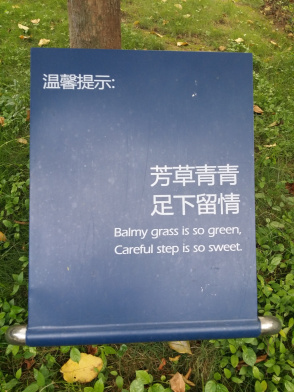
Some grassy poetry
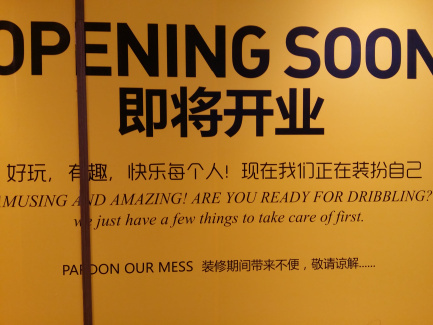
I am so ready for the dribbling!
Lastly, while this is not Chinglish I do find it both amusing and amazing. A bootleg Wonder Woman Lego figure, and they seem to have gotten something wrong about those Marvel-Avengers films…


June 17, 2015
Calling All Interviews
Hi there fellow bloggers and writers,
Do you have anything interesting on the horizon you’d like to promote? Do you have a backstory worth telling, and some good advice on the craft of writing?
Then I just may like to interview you.
For the sake of new content, mutually satisfying co-promotion, and of course always looking for something cool to read/write, I have decided to utilize my finely-tuned journalism skills yet rarely honed of late and post more interviews here.
Previous interviews, both the newspaper sort and those concerning myself, can be read at this link:
http://rayhecht.com/category/interviews/
What do you think? Don’t be shy! Please hit me up via email and let’s share and share alike
rayhecht@gmail.com


June 12, 2015
A Bite of Snail
June 7, 2015
Redtory Art District in Guangzhou
Despite the disappointing ‘comic con’, my little trip to Guangzhou wasn’t a total waste. In fact, I had a great time. It’s an amazing city, even bigger than the already-overwhelmingly mega cities of Shenzhen and Hong Kong. I recommend Turkish restaurants for example…
We decided to head to the Redtory/红专厂 art district, to showcase the lovely artistic side of the city. Like 798 in Beijing, it is made up of a former factory that has been refurnished into a space for galleries and hip little coffee shops. While Beijing’s version is far more successful and artistically valid, we make do with what we can in the Pearl River Delta.
http://www.redtory.com.cn/english
To get there, simply go to Yuancun station and right outside exit B there is a shuttle bus which only costs 2 yuan. Drive through an urban village area, it’s a little out there, but transportation is very convenient.
Open 7:00 a.m. to 11:00 p.m.
And then we made it!
Looks like a lot going on:
There was a quaint market, always fun to buy little trinkets and gifts.
Take a stroll to see the various shops.
Even some factory-themed readymades.
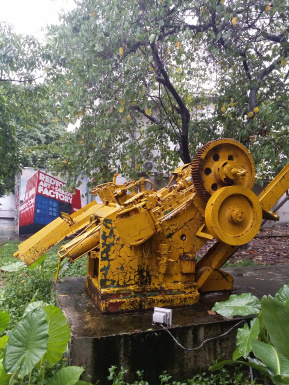
With many galleries featuring powerful works of painting, photography, and sculpture
916 Studio: The Persistence of Images curated by Wang Chuan
Click to view slideshow.
RMCA Hall: Black Birds exhibition by Israeli artist Avital Cnaani
Click to view slideshow.
The Redtory Museum of Contemporary Art featured an exhibit on “Neo-Mororism”
Tickets only 10 yuan
Click to view slideshow.
Lastly, I love this little mascot guy posted all over the place!
Click to view slideshow.


June 5, 2015
GZ Chinglish
Hey, just because I’m taking it easy with blogging (am I really?) doesn’t mean no more Chinglish!
A bit from my Guangzhou trip:
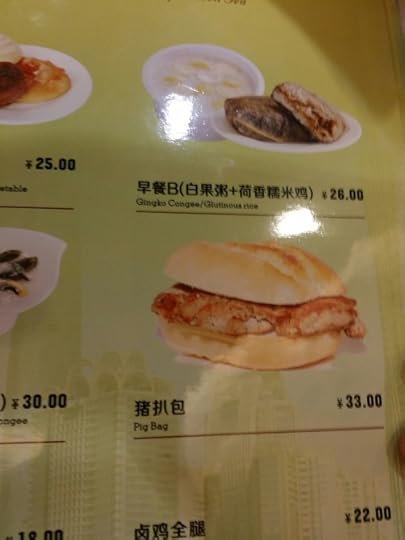
As a vegetarian I find it very offensive to eat a pig bag

Simple, accurate, but I find funny for some reason
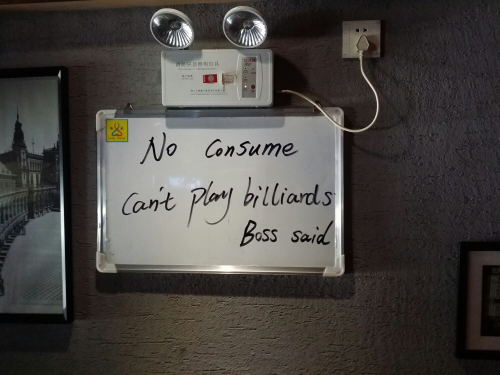
Just at a restaurant-pub. Listen to the boss!



